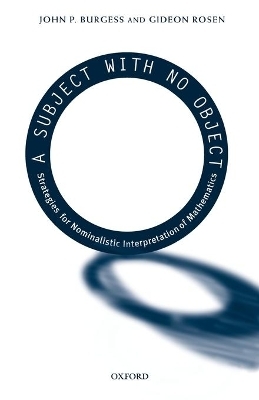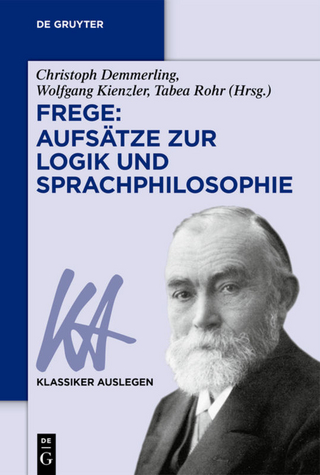
A Subject With No Object
Strategies for Nominalistic Interpretation of Mathematics
Seiten
1999
Oxford University Press (Verlag)
978-0-19-825012-8 (ISBN)
Oxford University Press (Verlag)
978-0-19-825012-8 (ISBN)
Mathematical objects are exceptional in having no locations in space or time or relations of cause and effect. Thus it is difficult to account for the possibility of knowledge of these objects. This text offers an account of a dozen strategies for a nominalistic interpretation of mathmatics.
Numbers and other mathematical objects are exceptional in having no locations in space or time or relations of cause and effect. This makes it difficult to account for the possibility of the knowledge of such objects, leading many philosophers to embrace nominalism, the doctrine that there are no abstract entities, and to embark on ambitious projects for interpreting mathematics so as to preserve the subject while eliminating its objects.
A Subject With No Object cuts through a host of technicalities that have obscured previous discussions of these projects, and presents clear, concise accounts, with minimal prerequisites, of a dozen strategies for nominalistic interpretation of mathematics, thus equipping the reader to evaluate each and to compare different ones. The authors also offer critical discussion, rare in the literature, of the aims and claims of nominalistic interpretation, suggesting that it is significant in a very different way from that usually assumed.
Numbers and other mathematical objects are exceptional in having no locations in space or time or relations of cause and effect. This makes it difficult to account for the possibility of the knowledge of such objects, leading many philosophers to embrace nominalism, the doctrine that there are no abstract entities, and to embark on ambitious projects for interpreting mathematics so as to preserve the subject while eliminating its objects.
A Subject With No Object cuts through a host of technicalities that have obscured previous discussions of these projects, and presents clear, concise accounts, with minimal prerequisites, of a dozen strategies for nominalistic interpretation of mathematics, thus equipping the reader to evaluate each and to compare different ones. The authors also offer critical discussion, rare in the literature, of the aims and claims of nominalistic interpretation, suggesting that it is significant in a very different way from that usually assumed.
John Burgess is Professor of Philosophy and Gideon Rosen is Assistant Professor of Philosophy at Princeton University.
PART I: PHILOSOPHICAL AND TECHNICAL BACKGROUND; PART II: THREE MAJOR STRATEGIES; PART III: FURTHER STRATEGIES AND A PROVISIONAL ASSESSMENT
| Erscheint lt. Verlag | 2.12.1999 |
|---|---|
| Zusatzinfo | diagrams |
| Verlagsort | Oxford |
| Sprache | englisch |
| Maße | 137 x 214 mm |
| Gewicht | 391 g |
| Themenwelt | Geisteswissenschaften ► Philosophie ► Logik |
| Mathematik / Informatik ► Mathematik ► Allgemeines / Lexika | |
| ISBN-10 | 0-19-825012-6 / 0198250126 |
| ISBN-13 | 978-0-19-825012-8 / 9780198250128 |
| Zustand | Neuware |
| Haben Sie eine Frage zum Produkt? |
Mehr entdecken
aus dem Bereich
aus dem Bereich
ein Gegenentwurf zum kurzfristigen Denken : so werden wir zu den …
Buch | Hardcover (2023)
REDLINE (Verlag)
18,00 €


